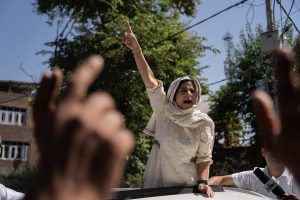Indian-administered Jammu and Kashmir (J&K) voted in the first phase of assembly elections — the first in a decade — on September 18. Voters stood in long lines outside polling booths to cast their ballots.
Late on Wednesday, the Election Commission of India reported a voter turnout of 61.13 percent in the first phase of the three-phase assembly election.
Eight assembly constituencies in the Jammu region and 16 from the Kashmir Valley voted in the first phase. Two more voting phases will be held on September 25 and October 1 in the remaining 66 assembly constituencies; counting of votes is scheduled for October 8.
Kishtwar district, which recorded 80.14 percent turnout, saw the highest voter turnout across J&K. It was followed by Ramban at 70.55 percent, Doda at 71.34 percent, Kulgam at 62.60 percent, Anantnag at 57.84 percent, and Shopian at 55.96 percent The Pulwama district recorded the lowest at 46.65 percent. While Kishtwar, Ramban, and Doda are in the Jammu region, Kulgam, Anantnag, Shopian, and Pulwama are in the Kashmir Valley.
Historically, voter participation in Kashmir has been low due to threats from militants advocating for independence. However, in the April and May national elections, turnout reached 58.46 percent, the highest in 35 years.
“Kashmir has been disturbed for ever, said Raja, a 75-year-old voter. “We are voting for peace and change.”
The J&K assembly election is the first since the erstwhile state lost its autonomy and statehood. In August 2019, it was split into two entities – Jammu and Kashmir, and Ladakh – which were made union territories and brought under Delhi’s direct rule.
According to India’s Bharatiya Janata Party (BJP) government, J&K’s development and return to normalcy have been facilitated by the revocation of its autonomy.
Key issues in the elections include the detention of numerous young Kashmiris in Indian jails, along with local challenges such as rising drug abuse and unemployment. Government estimates from July indicate that Kashmir’s unemployment rate is 18.3 percent, more than double the national average.
“There are a lot of issues that we have been facing here. We can’t even go out during the late hours because of the presence of the security forces in the area,” lamented Naziya, a 50-year-old woman.
“We are glad that we will see a change. We want our regional government and an end to governor’s rule. Our regional government might understand us. No one else can,” said Khursheed Ahmad, 50.
The election in the Kashmir region pits the Kashmiri regional parties, the National Conference (NC) and the People’s Democratic Party (PDP), seeking to restore J&K’s special status against the BJP, which aims for economic development and an end to militancy.
After three decades of conflict, Kashmir remains one of the most militarized regions globally, with over 500,000 Indian troops deployed.
“I am casting my vote because we are being oppressed. If Waheed ur Rehman had become our leader, our oppression would have ended,” stated Aisha, 55. “We are being oppressed, children have been imprisoned, and they are being subjected to unjust actions. Now, if Waheed becomes the minister through this vote, we will be free.”
Thirty-six-year-old Waheed ur Rehman Para of the PDP ran in the 2024 general election but did not win. He is contesting now in the assembly election from Pulwama on a PDP ticket.
In addition to the NC and PDP, the national parties — the Indian National Congress and the BJP — as well as scores of independent candidates are in the electoral fray in this historically volatile region.
“The situation hasn’t been good in the past few years, and there was a reign of lawlessness here. But now, since the parliamentary elections took place in April-May, we feel more confident, which is why we’ve come to cast our vote here,” said one voter.
“Before this, they used to make anyone a leader, and our vote didn’t carry any value. But today, we feel 100 percent sure that the elections will be fair and that a good leader will represent us,” added Ali Mohd Mir.










































